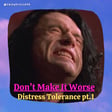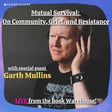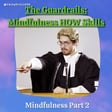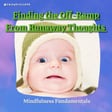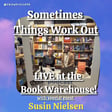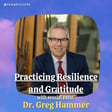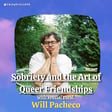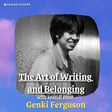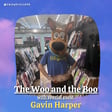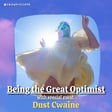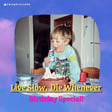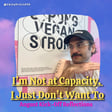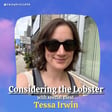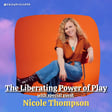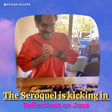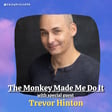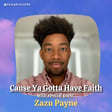Introduction to 'Friendless' podcast and guest Florence Ann Romano
00:00:08
Speaker
Well, hey there, sweet peas. Welcome back to Friendless. I'm your host, James Avromenko. And this week, I'm chatting with Florence Ann Romano. She's the author of the new book, Build Your Village.
00:00:20
Speaker
Together, we dive into what real connection looks like post-COVID. why asking for help feels so goddamn hard, and how to rebuild your community from the ground up.
00:00:31
Speaker
This was a fantastic conversation. I was so excited to share it. So let's get into it.
Building Supportive Communities with 'Build Your Village'
00:00:36
Speaker
It's time to lean back, get comfy, set your volume at a reasonable level, and enjoy my interview with Florence and Romano here on Friendless.
00:00:47
Speaker
To start us off, just to really plant the like the foundation for audiences, or excuse me, for listeners who may not be familiar with your work, could you just tell me, who the hell are you? Yeah, it's very easy to be not familiar with my work. Yeah, absolutely. like So I wrote a book called Build Your Village, a guide to finding joy and community in every stage of life. And the reason I wrote it was because I heard people bemoaning the fact all the time, where are these people? Where are these people that are supposed to what? Show up at my front door and be my friend, help me raise my kids, give me a casserole for dinner. I don't know, where are these people?
00:01:25
Speaker
And it was during COVID, honestly, that I looked around and realized that on a global level, and what do you experience in life that honestly happens on a global level that's a common denominator for everyone, I realized on this global level, we all knew what was like to lose our support system.
00:01:43
Speaker
yeah And so I wanted to answer the question, where is the village? but That proverb, it takes a village to raise a child, as true as that is, and I love it.
00:01:54
Speaker
I do think it does exclude quite a bit of the population because what if you don't have kids? Does that mean you don't deserve people? Does that mean you don't deserve support? So I wanted to take that proverb, chop it in half.
00:02:08
Speaker
It takes a village, period.
Global Loss of Support Systems and Community Importance
00:02:09
Speaker
And really use that as the foundation to creating the directions to this elusive village everyone talks about, regardless of age, whether you're 18 or 80. I wanted something to be evergreen in nature and a home base for people.
00:02:25
Speaker
something to anchor them when they feel like they're starting over, whether that's a new city or after a breakup, after a death. These are times where our villages change. And sometimes I think, oftentimes I think we do need help figuring out how to navigate that change.
00:02:43
Speaker
Yeah. And I appreciate that perspective so deeply in the sense that at what point... Do we stop being the child in the sense that it almost implies that we we lose a type of humanity when we become this sort of self-driven individual? When it's, no, that's the time when we need it even more, is like are these connections, right? Yes.
00:03:02
Speaker
Yes. I think that's really well said. And what kind of things have you been seeing? Because I'm right there with you. Seeing that I think all the problems were already there prior to COVID. Yeah.
00:03:14
Speaker
But they became very spotlighted because all of our support systems just collapsed overnight. When everybody suddenly realized, oh, nothing was working and now I have to face That's so true. Yeah. Nothing's working. And now you have to face the reality of that.
00:03:29
Speaker
That's just it. And I'm curious, what was your sort of, ah did you have like a personal awakening moment to that, that sort of sparked your interest in this or was it sort of an observation to others? Yeah, I did. I had a lot of different things happen during COVID, I think to all of us. But what was funny was I decided during that time single, no children. i decided to freeze my eggs. What a bizarre time to go and do that. But I read a lot of articles that I felt I was ahead of the curve.
00:03:58
Speaker
I felt like I had already decided I was going to do that. And then everybody else during COVID decided they were going to start doing it. I'm like, hold on a second. I started this trend. No one talked to me about it but I do think I started this trend. yeah And so I did do that. And it was a great time to do it. I went through a few different cycles of that. And It did put life into a different perspective for me. And I think a lot of people during COVID had those moments of reflection, those evaluations that they were doing. It was also during that time during COVID where I was living in the city. I had been living. I'm from Chicago. I was living in the city proper for almost 15 years. And I decided I wanted to move back to my hometown. in the suburbs and i did that.
00:04:41
Speaker
And it it was a wonderful decision, best decision I made. But it wasn't really until I was going through COVID and everything was shut down and Chicago looked like Gotham. And I was like, I'm feeling really isolated and all of my friends are married and have kids and live in the suburbs. And I feel like they're a part of something there still, even if things weren't normal, I felt there still more connection that they had access to than I did.
00:05:09
Speaker
And my family also, I'm very close to my family. We're big Italian family. I wanted to be closer to them too. And it really did put connection under the microscope for me. And what was really cool and also heartbreaking was everybody felt the same way I did.
00:05:26
Speaker
And we needed to ride that wave together. But now, present day, five years post-COVID, I'm still seeing the effects of it. I'm still seeing our society, our culture suffering from a friendship recession, from a loneliness epidemic.
00:05:44
Speaker
We really haven't recovered from it. And some of that is not out of, some of that is not in our control, pardon me, but some of it
Fear of Connection and Social Media's Impact
00:05:53
Speaker
is. And that's part of why writing the book was so important to me was to empower people to take back that control in their life.
00:06:02
Speaker
And oh, you know so you've already, you've tapped into nine different things I want to talk about. um Forgive me, the Italian in me coming out where just go down a lot of different avenues and I'm like, follow me. I love it. I love it. But there's, there's so okay.
00:06:17
Speaker
ah Something I've been thinking a lot about recently that that I want to dig into deeper as we go along the interview, but this idea of A lot of us, myself very much included, have these wishful, oh, I want friends like this. I want a community like this.
00:06:32
Speaker
But we wait around for it to happen to us. And we don't necessarily go out and make it happen. And then on the other side, when you do you actively go out and you put that work in, you put the steps, you reach out to people, you connect to people, whatever it might be, it's not always reciprocated. And that can sometimes feel even more exhausting, right? When there's ah sort of a one-way intentionality.
00:06:51
Speaker
And we're going to dive into all the different points of it. but But something... So my day job is I'm a teacher. And something that I'm seeing right now with my students... I work with predominantly kind of like post-grad, early 20s kind of age. And I would argue...
00:07:06
Speaker
ah kind of a deeper version of what you pointed out, which is that not only are we seeing the ramifications, we're actually, I think we're only now seeing the true impact that lockdown had, that all that general societal trauma happened. Like right we thought we knew what happened, but it's only really
Challenges of Younger Generations and Emotional Regulation
00:07:23
Speaker
manifesting now with the anxiety levels and the inability to reach out and the fear of connection, even though that's what we need. Absolutely.
00:07:30
Speaker
I love hearing you say that term, the fear of connection. I don't love that it's true, but but that is is well articulated. And i i want to to to spend time on that piece of it because I feel like that is the debilitating factor for people often.
00:07:49
Speaker
And why is it that people are afraid of connection? One of the first things I'm drawn to, or I have found in my work, is that it's debilitating because people are measuring their worth against something else or someone else. And not only is that is that difficult for people to to evaluate on their own terms, but at the same time, you're also looking
00:08:23
Speaker
at Disconnection equating also to asking for help. And asking for help is one of the hardest things for a human being to do.
00:08:35
Speaker
I think it's right up there with like public speaking. people a Public speaking, not even not for you and me, but public speaking for a lot of people and asking for help. yeah And it's like right there. And why is that the case?
00:08:47
Speaker
We live in a society now where we are digesting and ingesting so much social content, social media content. I always believe moderation is a great rule of life, right? Everything in moderation,
00:09:02
Speaker
Social media is that too, but social media can also see be a cesspool for people. yeah And it also does illuminate people's worlds in a very intentional way. And sometimes that intentional way is not real.
00:09:20
Speaker
yeah And it's hard for us as human beings to discern what is real, what is authentic and what is just a snapshot or a highlight reel. Yeah.
00:09:31
Speaker
And then I always say to people, you go to bed at night, you lay down and you wonder, why do I feel so heavy? Why does my heart feel so, so anxious? Why does my brain perhaps feel so foggy or so dim?
00:09:48
Speaker
And you can think any words you want with it. And we have to pay attention to the type of content that we are exposing ourselves to, the people that we surround ourselves with.
00:10:00
Speaker
And the values that we align ourselves with in our lives in many different ways. So that's a very long way of saying, why answering the question, why are we fearful of this connection? We're afraid of rejection, as simply as is simply said. And we also feel like we don't have the tools ourselves to solve that problem. And so that's where I do hope
Productivity vs. Self-Worth and Community Support
00:10:26
Speaker
I come in and can help solve that problem for you.
00:10:29
Speaker
I also feel like I see this like internalized mistake, mistaken connection of we've equated our productivity with our value and productivity in this sort of like classic capitalist sense is you bootstrap yourself up and you're only valuable based on how much money you've made. And that's your equation for success. And the myth is that people do that on their own, no help. They just gumption themselves through. Will it to happen. Right? Will it to happen. Exactly. Exactly. And so to ask for help is paramount to death because it's to be a failed capitalist basically. And and it's just, it's crossing the wires on so many different stories that are actually separate from each other.
00:11:09
Speaker
I think the idea of how we value ourselves is a very important piece of this conversation. I think that's always an important piece of the conversation. But when talking about this idea of village or community, bringing up value in the many different ways that you did, and I'm glad that you did, is paramount, to use your word, because it they we sometimes think that we're not deserving of it.
00:11:37
Speaker
And we're not deserving of that love. One of my favorite songs by Luca Fagal is called Worthy of Love. And it's just such a beautiful anthem about this. And I often look at...
00:11:50
Speaker
especially because I'm so curious about people and human nature, and that's what brought me into the personal growth category. But no matter what you were born into, because sometimes you're not born into the family that you wish you were, and maybe you don't have the best role models.
00:12:09
Speaker
I come with my own baggage. Everybody does. Remember in the play Rent, they say, I'm looking for baggage that goes with mine. Isn't that the case for romantic relationships and platonic relationships? No. I grew up in an old school Italian family, a multi-generational home. like My grandparents lived with us. So I did have a lot of support growing up. I had a very traditional nuclear family. my My cousins were my first best friends.
00:12:32
Speaker
And did see what village in the quintessential old school traditional way that people think about village. I experienced that.
00:12:44
Speaker
But as I grew up, I realized that not everybody had been exposed to what I was exposed to. And I wanted people to feel empowered that they could choose it for themselves eventually. if they Of course, that can't happen when you're a child, but certainly I want them to be able to choose that for themselves when they become
Societal Transitions and Changing Support Systems
00:13:03
Speaker
And we also have changed as a society in terms of your nuclear family. a lot of people don't live near their family anymore by choice or maybe not. And that changes also your support systems in a big way.
00:13:17
Speaker
As we break this down from a socioeconomic standpoint, I call it a social ecosystem as well when it comes to terms with your village and your community and what lacks and what maybe perhaps is overflowing. These are all things to consider. And what I'll tell you also is difficult for people is this work itself is very honest and very vulnerable and it's not the most comfortable place to go. Yeah.
00:13:45
Speaker
Yep. There's a, my therapist often really likes to remind me of this idea of you can't have vulnerability without authenticity or sorry, reverse. You can't be authentic without vulnerability. Sure. But works the other way too it does. It correlates, right. But then you can't be vulnerable without risking being killed because you have to show your soft bits to be vulnerable. And that goes against our survival instinct, but it, but <unk>re we're forgetting that to show ourselves vulnerably in order to connect to somebody authentically is not actually going to kill us. It just feels like it because our nervous systems are shot. Oh, it's so true.
00:14:21
Speaker
Since you work with kids and I know you're doing the interviewing here, since we're, I yeah feel like I'm chatting with you just like, ah yeah that it feels great. ah Since you work with that age group in their early twenties, would you say that I know what we're talking about will resonate with them, but would you say that I guess I'll rephrase that. How do you feel like those early 20-year-olds would categorize their their fear when it comes to what you're describing? Do they fear do feel fearful and why? And is rejection a big part of it or is a lack of time? Whatever it might be, but I'd love to know what your observation is. Yeah. You know what? Something for me is that there so it strikes me that they're overwhelmed with this kind of nameless anxiety.
00:15:11
Speaker
It's this very kind of just overarching, generalized anxiety around things. And more often than not, they can't actually name the direct thing that they're afraid of. But that ends up just shutting them down altogether.
00:15:23
Speaker
And so one of the things, so a piece of my job is I develop soft skills for people who are doing like career development stuff. And one of the biggest pain points for them is they don't even know what they're afraid of.
00:15:35
Speaker
And they don't know how to ask for the help that they need because they don't even know how to recognize what's actually happening. and And it comes back to this idea of we don't know how to process our emotions until we're shown how to do it. We're not born. We're just born knowing how to scream.
00:15:51
Speaker
And we need to be shown how to how to regulate and how to do these things. And if we were never modeled that, then we'll never learn it. We'll just develop whatever survival techniques we come up with. And those aren't often the most effective, but those often lean to lead to deeper problems. And so, yeah, the young people I work with often, I'll do, we'll do sessions on things like imposter syndrome or different kinds of regulation, self-confidence building.
00:16:12
Speaker
And at the end of class, but without fail, every time I teach it, I'll have a handful of students saying, I had no idea there was a word for that. Like they didn't even know That what they felt was a thing that they could even talk about. They just thought it was like, you know, them and they were broken and they were failures. So I think a lot of it is that they just they were not taught how to recognize these things. And this is why i always push back on anybody who says things like this generation's.
00:16:39
Speaker
X, Y, Z, whatever they call them lazy, they call them whatever they want to say. And it's, you know, whatever failings you perceive in young people today are your failings, not theirs, because they weren't taught properly. It's not, you didn't show up knowing how to do this stuff. So why do you expect them to?
00:16:54
Speaker
ah Where did the breakdown happen, do you think? What happened in the system where they didn't learn that versus maybe someone, like yeah people like us, we I feel like I was equipped with yeah that. Yeah, would probably, a I think flippantly, I would say Ronald Reagan, but...
00:17:09
Speaker
That's where it all steps, but it goes even further back, so
Post-COVID Social Behavior and Children's Development
00:17:12
Speaker
who the fuck knows? But it's more about, i think, in terms of the modern, say, the last 20 years or so, it's just been this hyper-escalation of really intense entrepreneurship as, like, hero worship, like the sort of celebrity culture of these, the Elon Musks and the Bill Gates and the Steve Jobs, that this sort of elevation of this singular great brain person who, if you just have one big idea, you can go do that. And I think...
00:17:39
Speaker
And somewhere in that kind of hero worship, we lost the concept of all the people that those people work with. And we lost the concept of the community that built those things.
00:17:50
Speaker
And... that trickles down into what our kids interested in doing how are what are they interested what are they curious about and if they're just if they're just curious about how do i learn how to code so that i can be a billionaire and like that's not really going to lead to explorations of empathy and explorations of community or connection or i don't think it is one single thing i think that's one strand of it right that's one singular strand but i think there's just there's a a number of things right it's the the defunding of education programs. it's the diaz It's the cutting of arts programs and thinking that the only way
00:18:28
Speaker
quote unquote build character is to play sports when it's no, the arts and the humanities are literally there for us to understand why we are the way we are and how to talk about it with each other. Can I ask you why you also too, and I'll add to this too.
00:18:43
Speaker
We talked about a loneliness epidemic in our country today. That's very true. And I think a lot of people feel it As you look at your life in different seasons, you're in school and you feel like the world is your oyster because you've got a lot of different ways to connect. Yeah.
00:18:58
Speaker
But to go back to the COVID example for for a second, what I found with that was not only once it was time to reemerge from COVID, ye that it was time to connect again. it was time to be with people again.
00:19:16
Speaker
what What occurred though after that was mystifying to me because we were all banging and screaming about the fact that our worlds were shut down.
00:19:27
Speaker
And when finally we were able to come back to it, depending on where you lived, like in Chicago, it took forever before we were allowed to do anything. sure And, but finally, when you were, you looked around and you're like, wait a second.
00:19:40
Speaker
I don't know if I want to. Exactly. i don't know if I really want to go meet someone for coffee. Not because you're scared about disease or that. that was just because I'm like, I'd rather stay home and watch Netflix. I think actually, don't really want to connect with anyone. Yeah. So it did us a disservice, like you said in the very beginning of the show, that we're realizing the consequences of that.
00:20:01
Speaker
People who were not that social to begin with went into that tortoise shell, retreated in that tortoise shell, and to coax them out again was extremely difficult. for Children who needed socialization, they were extremely- They got ripped off.
00:20:15
Speaker
Right. yeah And they are today. I can look at so many kids in my own life, my friends, children, where they are still trying to catch up with what happened. So a lot of things were handled poorly, were handled badly during that time. but What we're seeing though is that it's not just affecting our children, it's affecting adults as well.
00:20:35
Speaker
And your age group that you're talking about in those 20s, that seems like the time where you should have so many opportunities for connection and friendship. But that generation is suffering from so much.
00:20:50
Speaker
And that idea of connection and how to do it Like you said, it needs to be modeled for them. For whatever reason, they are part of this microcosm where it's not a natural instinct, yeah where maybe it was for some of us or a lot of us in the past.
00:21:11
Speaker
But it's not anymore. And that's led me to really spend some time thinking about what you are doing so beautifully in your life, what you've dedicated your life to and what you advocate for are these soft skills. yeah And like you said, someone has to teach these things to you. But we also need to take responsibility as adults, as parents, as caretakers, whomever it is, and say, what am i modeling for the younger generation? And so there is accountability that I think is needed from the generations ahead.
00:21:45
Speaker
And I'm not saying it's only on their side of the street. Certainly i always tell people People do what they want to do. People don't do what they don't want to do. So what do you want to do? yeah it's that Yeah. At some point you have to be the solution to and asking for help doesn't make you weak.
00:22:01
Speaker
So that's also part of it too. But I think that's also a problem with the jet that generation today that we're discussing is too, that they are comparing themselves so much to what they see. That's just it. There's that social pressure to, and they're all vanity metrics, right? The thing is that they're hooked on the wrong things and they think the follower count and the like count is the thing that gives you value. And it's like, oh, who are you?
00:22:21
Speaker
No, and you go off, even me, who again, with my business and stuff like that, of course you have to be on social media, you have to be engaged and stuff like that. But i when I disconnect, when there's a day where I know I'm not going to go on, and right and I feel so good. I do. And I'm like, man, but I'm part of a generation that knows what it felt like not to have social media. That's just it. And sometimes I miss it.
00:22:46
Speaker
Oh, man, do I miss the night. Oh, I think about it all the time, right? Oh, my God. I miss being bored, right? I miss just being like, i guess I'll just go kick rocks in the field or something. i don't know. I like it. nothing else, right? That's what you go to. That shows you how old we are. that we're like If there's nothing else to do, then we'll just kick rocks. yeah they We'll go to the tar pit and that it over there. I guess I'll take a can and put a string in it and do a walkie-talkie thing. just like yeah But had a good childhood. I did. We were outside all the time. We used our imaginations. And
00:23:19
Speaker
I do think there was a lot to that building the fabric of my my again, my generation or that that time in our
Ending Friendships Gracefully and Relationship Changes
00:23:27
Speaker
lives. But but anyway, to go and going down a rabbit hole. Yeah, I love it. I though, I do want to talk about that for a second, because sometimes it's in the stillness.
00:23:39
Speaker
That's right. yeah We do find a lot of answers and that stillness is, is almost, it's almost phobic for people to be still, to be quiet.
00:23:50
Speaker
And I, there's a great saying, one of my favorite philosophies in life, when you don't know what to do, be still. And I've done that so much in my life where I've needed to take a step back because to your point, we should be doing, we should be achieving, we should be running, keeping up with the pace.
00:24:06
Speaker
But that's not always the appropriate choice. And I think that's oftentimes where we do get ourselves into trouble. And even with this idea of connection and community, you're not going to be able to know how to do this work unless you know where you are.
00:24:22
Speaker
Exactly. And you're not going to be able to do that unless you take a step back and you're going to look at it from that 30,000 foot view. And you're also not going to do anything about it if you actually don't want to.
00:24:34
Speaker
that's And that's the quiet part out loud. And I say that to people all the time because they'll say, I want this, I want that. And then I'm like, okay, here are the steps to do it. And then you come back to those conversations later and you're like, what's the progress you've made? And there is nothing.
00:24:51
Speaker
So I'm like, okay, then this is not what you want right now. yeah Okay. That's a big, that was a, so I've been working with listeners of the show will be very familiar with my therapist, Scott. I shout him out all the time. I've been working with him for years. I'll shout out Mindy. My Mindy. Yeah, go Mindy. The truly... The greatest workers on earth. but But he gave me this reframe years ago that I continue to use where he would say, when you start telling yourself, I have to do something, it puts this pressure on and you don't and you don't do it. Right.
00:25:18
Speaker
But if you decide exactly what you're saying, if you ask yourself, do I want to or do I not want to? And both answers are just as valid. There's no one or the other. It's do you want to or not? Then if you want to, then do it. And if you don't, then don't. yeah And it takes all the pressure off of it.
00:25:33
Speaker
True. It does. But it, I love those buckets. I actually just did another media segment that was all about that as the I get to versus I have to thing with putting it perspective of the summer for parents saying, as you're going through your cobweb of your calendar, because it is hard for parents and of course wanting to say no and all those different things.
00:25:54
Speaker
That is, that's a really lovely way to frame things. for yourself but it's also true that word no being a complete sentence that's exactly right and that's important as well but then also the flip side to this coin we're talking about okay connection is so important building that village finding your people okay yes but then also what i'm finding at least in this stage of life for me and for a lot of people my age there's a lot of endings yes
00:26:26
Speaker
yeah And those endings, maybe their relationships, it could be divorces. I'm certainly at the age now where my friends are getting divorced. I'm through mine. Yeah. yeah yeah there you go Okay, there you go. and And then this is also trending toward that sandwich generation of taking care of your parents and people losing people close to them, family members, things like that.
00:26:48
Speaker
And as we look at the endings of things and relationships and friendships are that as well, one of the most popular topics right now for me, as I've talked to people or I've done media has been, how do you end a friendship?
00:27:04
Speaker
Yes. yeah And you end friendships for a lot of different reasons, but how do you do it with grace? How do you do it with conviction? What are the reasons why those relationships end? Why do you feel like you can,
00:27:17
Speaker
stand up for yourself and say this no longer serves me. And how do you explain that? But it's funny that ending something also takes just as much guidance as finding it.
00:27:30
Speaker
yeah And so that just goes to show you that the common denominator here is really the fact that we're not supposed to have all the answers. And sometimes It's okay to just take a step back and say, I need to learn more about this.
00:27:47
Speaker
yeah And it's okay that it doesn't come naturally and that doesn't make me a failure. There are a million things that I don't know how to do. Math is one of them. built I'm good at things. so right like You're a teacher. feel bad even saying I could not to save my life. I go out to dinner with friends.
00:28:02
Speaker
still counting on my finger for the test. no I'm like, we all can't do everything well. Okay. And so that's just the way it is. But there's also that piece of, of yes, accountability, but ah ah also ah authenticity, like you're saying, and also awareness that is also an important piece of everything that we're talking about. It really does come down to that awareness yes and being willing to always be the student to you, talking to you as a teacher. I think that's
00:28:33
Speaker
part of our job as human beings. So I love that you spun this into this sort of what you were talking about, kind of the ending the friendships, because this is something that I really wanted to dig in a little bit deeper with you. You talked a little bit, you talk in your book and you talk in in other places about this idea of you being the company that you keep.
00:28:51
Speaker
And I want to start there with talking about this idea of who you become based on the community that you're in or what, ah you know, and sometimes it's multiple communities at a time change who you are.
00:29:03
Speaker
But then the flip side of that is this idea of getting out and ending. And I i have not ended friendships well. I have sometimes, I sometimes have, sometimes haven't. I have a plethora of experience.
00:29:15
Speaker
But I am curious to hear your sort of take on the idea of this idea of lovingly ending a friendship. But I want to start first at the, let's say we're in the friendship first. And so, yeah, coming back to this, but you're the friendship you keep.
00:29:28
Speaker
How do you see that kind of community, impacting who we are? I'll give you a very specific example. So someone in my community, she stepped outside her marriage and her friends had a very difficult time figuring out how to still stay friends with her because their husbands were friends with the husband that was scorned.
00:29:55
Speaker
And i remember having a conversation with one of them where she said, I'm worried about what people will think if I'm still friends with her, that they'll think that her values are my values.
00:30:09
Speaker
And I said, it's fair. And I wasn't going to sit there and sugarcoat it. And I said, yeah, people are going to think what they're going to think. And you can't control that.
00:30:21
Speaker
It's more so about you and your value system. is she the type of friend that you want there's the phrase i hate if you hang around garbage you start to stink if you think that she's going to make you stinky yeah then you know maybe it's time to walk away from that now again everyone's can do whatever they want to do in their relationships and i'm not going to judge you for it or maybe i will and maybe that's not i mean and Maybe my judgment is going to be what pulls me away from that friendship. And that's what this woman was saying to herself was, you know what? I can't condone what you did.
00:30:56
Speaker
You and I clearly have a very different view of what marriage looks like and the commitment you make. And I'm just not the right type of friend for you. And she did up pulling away from that friendship. She's polite when should they have to see each other, but she no longer wanted to socialize.
00:31:16
Speaker
yeah And she did that, I would say, in a very graceful way where she was honest with her and said, it's just it's hard for me to morally get past that. yeah And that kind of was the end for her. And then for the gal as well, she was like, I don't have to like it, but I understand, you know, and that's, I made my choices. And this is part of the consequences of that. So that's a very specific example. But I like that example, because it's a difficult situation. It's very uncomfortable yeah to talk to someone who was your very good friend and be like, I don't really like
00:31:56
Speaker
your life choices. And so I'm going to have to step away. And how do you do that in a way where you can be respectful, but also said with conviction? So that's a very specific example of that.
00:32:10
Speaker
But to give another example, sometimes villages burn down without you being responsible for it. And that could be a death. And how do you rebuild after that?
00:32:22
Speaker
and These are crisis moments in our life where people flood in and thank God they do. That's wonderful. But then once the crisis is contained or over, then you go back to your life and like, where did all those people go?
00:32:37
Speaker
yes yeah And then you realize Okay, I need to do some rebuilding here of my own ecosystem. yeah And so again, these are different scenarios of what connection looks like and what's in our control, out of our control, and how do you rebuild? How do you have uncomfortable conversations?
00:32:58
Speaker
But I always say, you can say what you mean without saying it mean. And that's up to you. Yeah. And I think something that I think is really important to highlight that you brought up that I want to really, ah you know, spotlight is this idea of, you know,
00:33:13
Speaker
if From my perspective, the way I've gone through my therapy is really trying to remove the sort of good, bad decisions. yeah You did good, you did bad. And more about this aligns with my values, this doesn't. And so it's not saying these are bad people for doing this. It's just saying for me personally, it doesn't align with my values.
00:33:32
Speaker
And I think that is such a powerful framework. And it's also because even there's even like a slight nuance between the idea of like values and morals. there There is a slight difference. There The thing that I value is this kind of behavior.
00:33:46
Speaker
ah Whereas morals can get a little bit, I'm better than thee because I'm- It's a blurry line. That's the thing. it's They're very close to each other, but they're but there're there's a little, and I think, and I'm not trying to police lay. I just mean, it's it's it I think if you're not approaching this stuff really intentionally, you can slip into- yeah these different directions. and yeah And so I really appreciate the work and the stories that you're bringing of like how to parse that out and how to stay really clear to yourself.
00:34:12
Speaker
And that's the most important piece of it too, is again, if it's leaving you with this feeling in your stomach yeah that it just does not sit well, then you need
Understanding Friendship Dynamics and Personal Roles
00:34:23
Speaker
to address it. And it would be terrible if you remained in a friendship that didn't serve you because not only are you going to day going to probably build a lot of anxiety, build a lot of resentment. It's also not going to be fair to the receiving party because you're certainly not going to be showing up as your best self in that friendship.
00:34:44
Speaker
yeah And so sometimes the compassionate thing to do is leave. Yes. That's you're describing people pleasing one on one, right? I'm a recovering people pleaser and I will be for my whole life. My whole life.
00:34:56
Speaker
Right. Myself very much in in that same boat. And but it's it is that's the shadow work of people pleasing is realizing that. you're not actually helping anyone by quote unquote pleasing them. You're actually doing, i I, in a lot of ways, and maybe it's just because I'm like internalizing my own self-loathing, but it's like, I sometimes see people pleasing as more insidious and potentially more destructive in relationally than people who are just overt assholes.
00:35:24
Speaker
Because people who are just like, oh, absolutely. I totally want to come to your thing. I totally, I'll be there. Can't wait to see you. And then don't show up. And then, oh, I'm so sorry. I just had this, this came up, but don't worry. I'll be the next thing. And it's, and then always kicking the can or always being like, what do you want to do?
00:35:38
Speaker
What would you want to do? And it's maybe I don't want to make a choice. Maybe I want somebody else to make a decision. Maybe I'm exhausted. Maybe you I need somebody else. And those are just very those are just very simple examples too. Those are just surface level ones. It goes so much it goes worse, right? I love these examples because those are real. Those are daily life examples. And I think oftentimes we can speak in this broad stroke way and we do talk about things that are larger. Like I brought up infidelity or death or things like that. These are large things. Okay. That's not something you're coming across every day. So let's talk about things that are more realistic for a daily cadence. And those are those things.
00:36:15
Speaker
Look at A simple example to give, I give this one often, you pick up your phone because it rings or it vibrates. i don't know. My ringer hasn't been on in years. I don't know. So if I write a look and it's a text message from someone and I look at their name, pop up on my phone and I just ho roll my eyes bit and you think to yourself, okay,
00:36:36
Speaker
Not a great reaction. or What's that coming from? Is it not because I'm in a fight with this person necessarily? Maybe it's because this person is exhausting or this person is a taker.
00:36:48
Speaker
This person depletes me. This relationship with this friend is one-sided and I'm reaching my limit. So that's that's absolutely relatable. That's more of a relatable relationship. common occurrence, I would say for someone, but that's an example of, is that relationship, is that name that's popping up on your phone?
00:37:10
Speaker
Is that the right friendship for you? And in my book, I talk about the six archetypes of people that you have in your life, the six archetypes. And if you read the book, you can go and do more of a deep dive into that. But the whole point of it is Who of these six am i to other people? Yes. And who of these six do I need?
00:37:31
Speaker
And because I don't want this to be an exercise of gimme, gimme, gimme take. yeah This is the circle. This is reciprocal. And it is knowing thyself and also knowing how you serve. And as you do this work of building community and building connections, you have to be very honest about what you're looking for and also how you show up for people.
00:37:56
Speaker
And that is going to lead to a lot of hopefully epiphany moments for you about what is working and what isn't in your life. And also how you can be in service of others from a place of support.
00:38:12
Speaker
And also knowing that if you're in a transition time in your life, that you should be empowered to make some changes yeah and that you're worthy of it and deserving of it. And that there, no matter what the case is in your life, there is a place to come back to. There is a home, there
Embracing Discomfort for Growth
00:38:32
Speaker
is an anchor. And that is this work.
00:38:34
Speaker
of connection. And the, like I said, the rules, the tools, the tips, the tricks, it's evergreen in nature. And it's supposed to be. The only thing I can guarantee anyone is that nothing stays the same.
00:38:48
Speaker
ah Yeah. You might as well start being nimble now because you're going to need to. yeah If I can tell if you're those early twenties kids that you're working with, I'd be like, you just got to know.
00:38:59
Speaker
Yeah. that Life ain't fair. So that actually that that loosening back into thought, but that it it leads me into I'm cognizant of the time and I want to make sure i just want to get a couple quick things in. But it loops back to this idea of when we were in lockdown, we were comfortable because we were in little cocoons. And the thing is that being alive and truly thriving, you have to be a little uncomfortable.
00:39:18
Speaker
You know, like to grow and to truly push, you have to have some resistance. You can't just be warm and cuddly and in your blanket all the day. Like that comfort is very different from safety. And we've taken that. Like you can be uncomfortable and still safe. And we haven't.
00:39:33
Speaker
been, ah I don't think we've allowed enough people to experience experience that of like safe push, you know? Because now it's at the stage where if you fail once you're fired, right? but There's no room for soft failures or safe failures, right?
00:39:46
Speaker
love that. Love that. yeah that You can be uncomfortable, but safe. I think right that's such an important piece of it. And because it's it's our nervous system that's telling us, and our nervous system's an idiot.
00:39:57
Speaker
but but but But that leads me into a piece i got thinking about, again, as I was researching you, and you were talking about this idea of why are young people doing this kind of quiet quitting stuff? And what I saw it as was less about the sort of the quiet quitting at work and more about People are quiet quitting friends and they're deciding rather than having these difficult conversations that may or may not lead to a continued friendship or it might lead to a break off or whatever it might be.
00:40:25
Speaker
Instead, they just sit back and let it fade and just hope that somebody else will do it for them. Right. you think that's right or wrong? I'm going to answer the question for you, but I have. So from my personal experience, I have, so I feel like I have experienced people quiet quit me and my, and friendship with me.
00:40:42
Speaker
i think I have experienced people quiet quit others around me. And I, I can't help but suspect it's correlated with what we're talking about, which is just the fear of fear of rejection.
00:40:55
Speaker
And rather than, having a conversation that may lead to a clear end. They'd rather just have this kind of murky, are we still friends, even though I haven't talked two years, right? Exactly. Exactly, yeah.
00:41:06
Speaker
I'll tell you what, I, I, I, being a single girl myself, I don't love the ghost because you know, that that's never great. I am like being an adult, but you can have conversation. Use your words.
00:41:17
Speaker
Use your words. You can do it. We're old enough, like way too old to not be doing that. But when it comes to friendship, the caveat I'll give to that is if you're in a situation with a friend where you feel like the effort is one sided, that's the exception to the rule.
00:41:32
Speaker
I would tell you, don't call them. Don't text them. Wait and see when they reach out to you. If they do, when they do, is it because they need something from you? yeah Or is it because they realize time has gone by, they're checking on you? Where is their investment in that relationship?
00:41:50
Speaker
That is the one caveat I would say to the ghosting or the murkiness is, If you feel like that is your responsibility, that friendship is your responsibility, you're going to see a lot by what that person doesn't do.
00:42:04
Speaker
they People say oftentimes if they wanted to, they would. And again, that's not the answer to every scenario, yeah but certainly in a scenario where you feel like you are being walked all over or taken advantage of.
00:42:18
Speaker
i I agree wholeheartedly. And I think that it's so, this is why I've been doing this show for seven years and it could probably go on for 70 because there's so much nuance and there's so much context to every situation. There isn't one prescriptive answer to anything because humans are weird when they're very complex.
00:42:36
Speaker
It's not a one size fits all. And you know what? You don't want it to be boring if if you didn't learn anything from everyone from anyone. I like the challenge of that sometimes, too. I like the challenge of different personalities.
00:42:48
Speaker
curious and it's exciting and also can be absolutely irritating and frustrating all at the same time. But. To go back to the original thing we talked about, emotions, right? Your feelings are never wrong. It's for your reaction that can be.
00:43:02
Speaker
And thats I think that's also a place that a lot of friendships can can swim those waters. And there's just like any relationship, friendships have dynamics and people get their feelings hurt. People feel betrayed.
00:43:17
Speaker
People feel celebrated. People feel ignored, misunderstood, all of those things. So it really comes down to support and showing up for people and making sure that you're surrounding your people with the quality that you want, not the quantity.
00:43:33
Speaker
And that remains to be true. I think in every stage of our lives is that you're looking for ride or dies, not just the, not just the ride-a alongs the ride alongs. Sometimes that happens and, but you have to You make that choice most of the time. You make the choice whether or not they're a ride or die or a ride along. I love that. But the end of all of this, to wrap it up, is that you're worthy of having these conversations.
00:43:58
Speaker
You're worthy of discovering this. And if right now in your life, you're feeling like this is calling you, that you're being moved toward this, you're gravitating toward it, then I really hope you do explore
Engaging in Community and Staying Connected
00:44:09
Speaker
And fail as many times as you need to do it because failing is not a dirty word. It's not a dirty word. It's so important, so good. I've done it so many times. Part of the reason I was able to write my book is because I failed at so many things. I try to help you not make the same mistakes and that I did. but would never take away any of those mistakes. I hope your listeners out there, if this is something they're exploring, that you'll look me up and talk to me about it, or just promise me that you're gonna explore it for yourself and not be afraid of the journey, because it's a good kind of fear.
00:44:38
Speaker
yeah Florence Ann, you're incredible. i feel like we we could talk for hours. had so many things I wanted to ask you and that we didn't get to. We didn't get to anything because we went on many different ways, but it's what it was supposed to be. That's it right there.
00:44:55
Speaker
That's exactly right. i want to you I always like to leave listeners with one last question for you. i always like to leave them with like kind of an actionable thing. well What's one thing that they could try to do this week to try to be a more effective friend to themselves or to their community?
00:45:07
Speaker
I always, my favorite my favorite tip is philanthropy. When you feel like you're stuck, when you feel like you're isolated, when you feel like you don't know how to take that first step toward connection, think about what makes your heart flutter.
00:45:19
Speaker
Get involved in your community and you're going to meet people that are like-minded, have similar values. And all of a sudden you're going be making connections that feel not as much of a heavy lift, not ah not such a burden. And the fear of rejection isn't as much there because you're go already going to be there for a common purpose.
00:45:35
Speaker
So it's less risk. So if this week you're looking for a way to put yourself out there in a more comfortable way, start doing some research and see see what's important to you and where you can get involved. And I promise you, you will start to make connections from that.
00:45:51
Speaker
Yeah. Amazing. Thank you so much. Where would you like listeners to find you for anything coming up Follow me on social media, Florence Ann Romano and my website, florenciann.com. That's where you can go and take a peek at the book. And if it speaks to you, i hope you it shows up at your front door. And i would show up at your front door too, if I could. so i hope that you connect with me virtually so we can have that. i can be that virtual village that people are looking for. Thank you again for having me. Thank you. I just, oh my God, this was such a blast. Thank you so much for coming on. I really appreciate it. Thank you.
00:46:30
Speaker
And that's it. Thank you one more time to Florence Ann for coming on the show. It was such a treat to meet her, get to know her, and and hear all of her incredible insights into the world of community building.
00:46:40
Speaker
If her perspective spoke to you, or if you're feeling inspired to take that first step towards connection, definitely check out her book, Build Your Village, and also follow her online for more actionable advice. All the links to her work are going to be in the show notes below.
00:46:55
Speaker
And as always, if you enjoyed the conversation, don't forget to hit the subscribe and share Friendless with a friend who, you know, maybe they could use a little bit more connection in their life. And if you want to take an even deeper dive into the wild, wacky world of Friendless, be sure to sign up for the sub stack.
00:47:11
Speaker
It's going to be the best way for you to stay up to date on new episodes, exclusive updates, behind the scenes thoughts from me, all kinds of fun stuff ah in that newsletter. The link is in the show notes. Please sign up.
00:47:23
Speaker
It is completely free. but that's going to do it for me. So I'm going to wrap it up here. I'll be back next week with another brand new episode. It's actually going to be a very special birthday celebration episode. ah So you won't want to miss that. I hope you will tune in, but I'm not going to worry about that right now. And neither should you, because as always, that is then and this is now.
00:47:42
Speaker
So for now, I'll just say I love you and I wish you well. Fun and safety, sweet peas.

